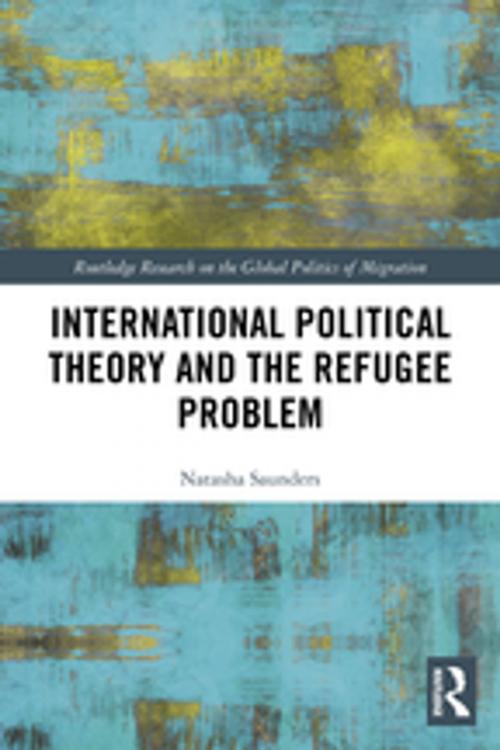International Political Theory and the Refugee Problem
Nonfiction, Social & Cultural Studies, Social Science, Cultural Studies, Emigration & Immigration, Political Science, International, International Relations| Author: | Natasha Saunders | ISBN: | 9781315304137 |
| Publisher: | Taylor and Francis | Publication: | November 22, 2017 |
| Imprint: | Routledge | Language: | English |
| Author: | Natasha Saunders |
| ISBN: | 9781315304137 |
| Publisher: | Taylor and Francis |
| Publication: | November 22, 2017 |
| Imprint: | Routledge |
| Language: | English |
‘The refugee problem’ is a term that it has become almost impossible to escape. Although used by a wide range of actors involved in work related to forced migration, these actors do not often explain what exactly ‘the problem’ is that they are working to solve, leading to an unfortunate conflation of two quite different ‘problems’: the problems that refugees face and the problems that refugees pose.
Beginning from the simple, yet too often overlooked, observation that how one conceives of solving a problem is inseparable from what one understands that problem to be, Saunders’ study explores the questions raised about how to address ‘the refugee problem’ if we recognise that there may not be just one ‘problem’, and that not all actors involved with the refugee regime conceive of their work as addressing the same ‘problem’. Utilising the work of Michel Foucault, the book first charts how different ‘problems’ lend themselves to particular kinds of solutions, arguing that the international refugee regime is best understood as developed to ‘solve’ the refugee (as) problem, rather than refugees’ problems. Turning to the work of Hannah Arendt, the book then reframes ‘the refugee problem’ from the perspective of the refugee, rather than the state, and investigates the extent to which doing so can open up creative space for rethinking the more traditional solutions to the refugee (as) problem. Cases of refugee protest in Europe, and the burgeoning Sanctuary Movement in the UK, are examined as two sub-state and popular movements which could constitute such creative solutions to a reframed problem.
The consequences of the ‘refugee’ label, and of the discourses of humanitarianism and emergency is a topic of critical concern, and as such, the book will form important reading for a scholars and students of (international) political theory and forced migration studies.
‘The refugee problem’ is a term that it has become almost impossible to escape. Although used by a wide range of actors involved in work related to forced migration, these actors do not often explain what exactly ‘the problem’ is that they are working to solve, leading to an unfortunate conflation of two quite different ‘problems’: the problems that refugees face and the problems that refugees pose.
Beginning from the simple, yet too often overlooked, observation that how one conceives of solving a problem is inseparable from what one understands that problem to be, Saunders’ study explores the questions raised about how to address ‘the refugee problem’ if we recognise that there may not be just one ‘problem’, and that not all actors involved with the refugee regime conceive of their work as addressing the same ‘problem’. Utilising the work of Michel Foucault, the book first charts how different ‘problems’ lend themselves to particular kinds of solutions, arguing that the international refugee regime is best understood as developed to ‘solve’ the refugee (as) problem, rather than refugees’ problems. Turning to the work of Hannah Arendt, the book then reframes ‘the refugee problem’ from the perspective of the refugee, rather than the state, and investigates the extent to which doing so can open up creative space for rethinking the more traditional solutions to the refugee (as) problem. Cases of refugee protest in Europe, and the burgeoning Sanctuary Movement in the UK, are examined as two sub-state and popular movements which could constitute such creative solutions to a reframed problem.
The consequences of the ‘refugee’ label, and of the discourses of humanitarianism and emergency is a topic of critical concern, and as such, the book will form important reading for a scholars and students of (international) political theory and forced migration studies.















